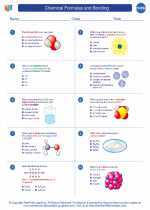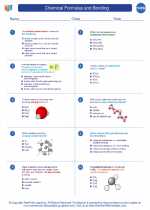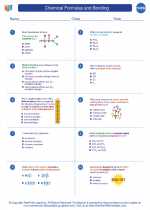Chemical Formulas and Bonding -> electrons
Electrons
Electrons are subatomic particles that have a negative charge and are found in the electron cloud surrounding the atomic nucleus. They are fundamental to the structure of atoms and play a crucial role in chemical reactions and the behavior of matter.
Properties of Electrons:
- Charge: Electrons have a negative charge, which is equal in magnitude to the positive charge of protons. The charge of an electron is approximately -1.602 x 10-19 coulombs.
- Mass: The mass of an electron is about 9.109 x 10-31 kilograms, which is roughly 1/1836th the mass of a proton.
- Spin: Electrons possess a property called spin, which is a fundamental aspect of their behavior in atomic and molecular systems.
- Wave-Particle Duality: Electrons exhibit both wave-like and particle-like behavior, as described by the principles of quantum mechanics.
Behavior of Electrons:
Electrons are organized into energy levels and sublevels within atoms, and they determine the chemical behavior of elements through their involvement in bonding and interactions with other atoms.
Study Guide:
To understand electrons thoroughly, it's essential to study the following topics:
- The structure of the atom, including the arrangement of electrons within energy levels and sublevels.
- Quantum numbers and their significance in describing the behavior and location of electrons within an atom.
- Electron configuration and the rules governing the filling of energy levels and sublevels with electrons.
- The role of electrons in chemical bonding, including the concepts of valence electrons and their influence on the reactivity of elements.
- The behavior of electrons in different environments, such as in electric fields or within materials.
By mastering these concepts, you'll gain a comprehensive understanding of electrons and their importance in the field of chemistry.
[Electrons] Related Worksheets and Study Guides:
.◂Chemistry Worksheets and Study Guides High School. Chemical Formulas and Bonding
Worksheet/Answer key Chemical Formulas and Bonding
Chemical Formulas and Bonding  Worksheet/Answer key
Worksheet/Answer key Chemical Formulas and Bonding
Chemical Formulas and Bonding  Worksheet/Answer key
Worksheet/Answer key Chemical Formulas and Bonding
Chemical Formulas and Bonding 

 Worksheet/Answer key
Worksheet/Answer key
 Worksheet/Answer key
Worksheet/Answer key

The resources above cover the following skills:
PHYSICAL SCIENCE (NGSS)
Matter and Its Interactions
Students who demonstrate understanding can:
Plan and conduct an investigation to gather evidence to compare the structure of substances at the bulk scale to infer the strength of electrical forces between particles.